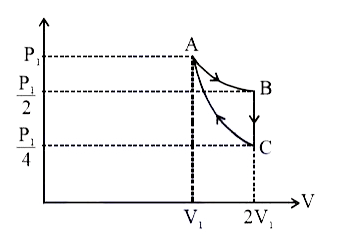In the isothermal reversible compression of 52.0m mol of a perfect gas at 260K, the volume of the gas is reduced to one−third of its initial value. Calculate w of this provess y.
0
+123J
−123J
+246J
The correct Answer is:2
x=−nRTln(Vf)Vl,Vf=1/3V
nRT=(−52.0×10−3mol)×(8.314JK−1mol−1)×(260K)=1.12¯4×102J
w=(1.12¯4×102J)×ln.13=+123J
Topper's Solved these Questions
Similar Questions
The pressure of a certain volume of a gas is reduced to half of its initial pressure at contant temperature. Calculate its new volume.
View SolutionCalculateq,W,ΔU and ΔH for the isothermal reversible expansion of one mole of an ideal gas from an initial pressure of 1.0 bar to a final pressure of 0.1 bar at a constant temperature of 273K.
View Solution
Knowledge Check
- Question 1 - Select One
Calculate work done during isothermal reversible process when 5mol ideal gas is expanded so that its volume is doubled at 400K.
A−11.5kJB−344kJC0D−2.8kJ
Calculate q,W,ΔU and ΔH for the isothermal reversible expansion of one mole of an ideal gas from an initial pressure of 1.0¯ to a final pressure of 0.1¯ at a constant temperature of 273K.
View SolutionCalculateq,W,ΔU and ΔH for the isothermal reversible expansion of one mole of an ideal gas from an initial pressure of 1.0 bar to a final pressure of 0.1 bar at a constant temperature of 273K.
View SolutionCalculate q,w, and ΔU for the isothermal reversible expansion of one mole of an ideal gas from an initial pressure of 2.0 bar to a final pressure of 0.2 bar at a constant temperature of 273K.
View SolutionIf one mole of an ideal gas at (P1,V1) is allowed to expand reversibly and isothermally (A to B) its pressure is reduced to one-half of the original pressure (see figure). This is followed by a constant volume cooling till its pressure is reduced to one-fourth of the initial value (B→C) . Then it is restored to its initial state by a reversible adiabatic compression (C to A). The net workdone by the gas is equal to :
 View Solution
View SolutionCalculate Q,W,ΔE and ΔH for the isothermal reversible expansion of 1 mole of an ideal gas from initial pressure of 1.0 bar to final pressure of 0.1bar at constant temperature of 273K.
View SolutionCalculate q,w,ΔU, and ΔH for this isothermal reversible expansion of 1mole of an ideal gas from an initial pressure of 10.0 bar to final pressure of 100bar at a constant pressure of 273K.
View SolutionThe volume of a given mass of a gas is reduced to 14th of its initial value of at constant temperature. Calculate the percentage change in the pressure of the gas.
View Solution

